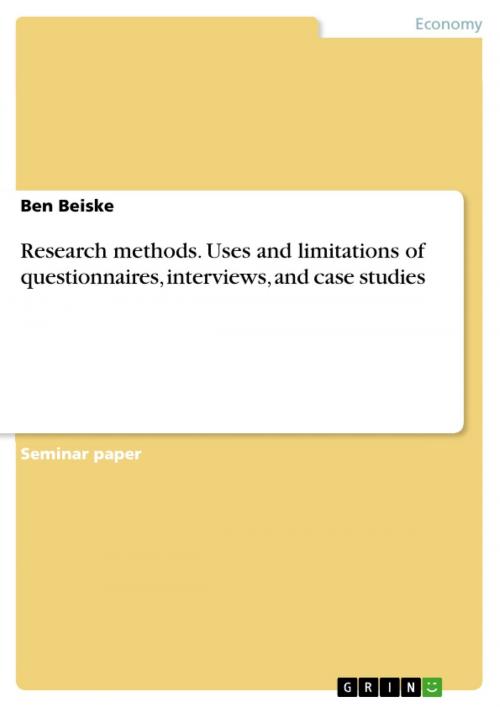Research methods. Uses and limitations of questionnaires, interviews, and case studies
Business & Finance, Business Reference, Education| Author: | Ben Beiske | ISBN: | 9783638205627 |
| Publisher: | GRIN Verlag | Publication: | July 17, 2003 |
| Imprint: | GRIN Verlag | Language: | English |
| Author: | Ben Beiske |
| ISBN: | 9783638205627 |
| Publisher: | GRIN Verlag |
| Publication: | July 17, 2003 |
| Imprint: | GRIN Verlag |
| Language: | English |
Seminar paper from the year 2002 in the subject Business economics - Didactics, Economic Pedagogy, grade: 2.2 (B), University of Manchester (Manchester School of Management), 22 entries in the bibliography, language: English, abstract: At the beginning of any type of research, it is paramount for the researcher to determine the most appropriate methodology to carry out the study. While factors such as time and costs certainly play an important part in deciding how to approach a particular research problem, the subject of the research itself should ultimately determine the methods used. A good researcher will evaluate all available options prior to making a decision as to which methods to adapt in the light of being the most useful for the study at hand. This paper will focus on describing a variety of methods, namely questionnaires, interviews, and case studies. Each chapter will give a brief introduction about the method, and then highlight the main strengths and limitations of each approach. Attention is also given to induction, which is defined as a data-driven approach to research, while deduction is seen as theory-driven. As such, the notion of data-driven versus theory-driven will be explored briefly for each method.
Seminar paper from the year 2002 in the subject Business economics - Didactics, Economic Pedagogy, grade: 2.2 (B), University of Manchester (Manchester School of Management), 22 entries in the bibliography, language: English, abstract: At the beginning of any type of research, it is paramount for the researcher to determine the most appropriate methodology to carry out the study. While factors such as time and costs certainly play an important part in deciding how to approach a particular research problem, the subject of the research itself should ultimately determine the methods used. A good researcher will evaluate all available options prior to making a decision as to which methods to adapt in the light of being the most useful for the study at hand. This paper will focus on describing a variety of methods, namely questionnaires, interviews, and case studies. Each chapter will give a brief introduction about the method, and then highlight the main strengths and limitations of each approach. Attention is also given to induction, which is defined as a data-driven approach to research, while deduction is seen as theory-driven. As such, the notion of data-driven versus theory-driven will be explored briefly for each method.















